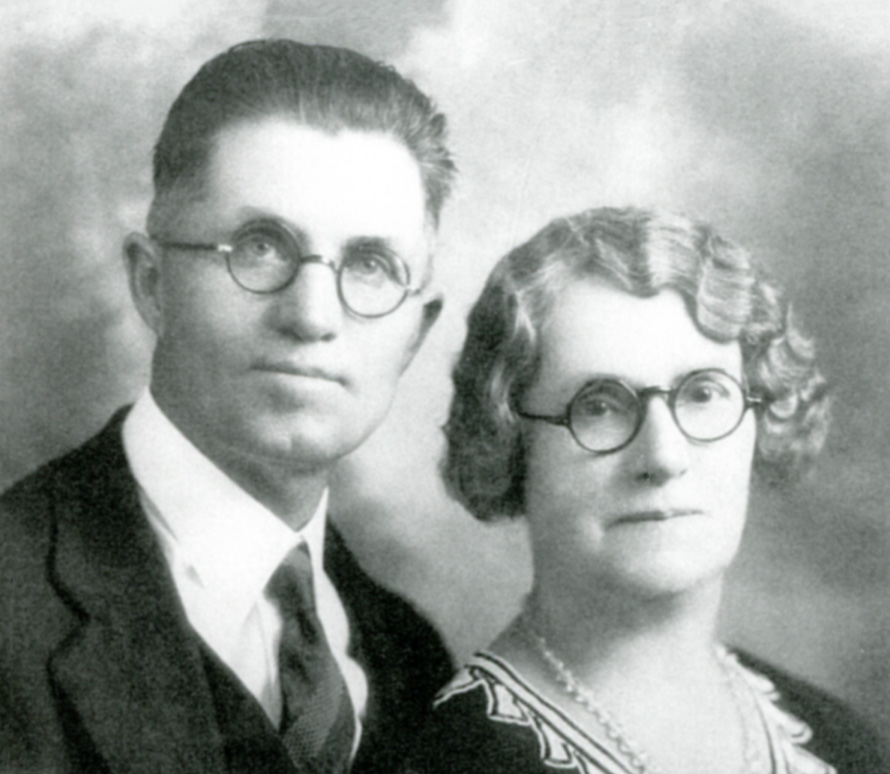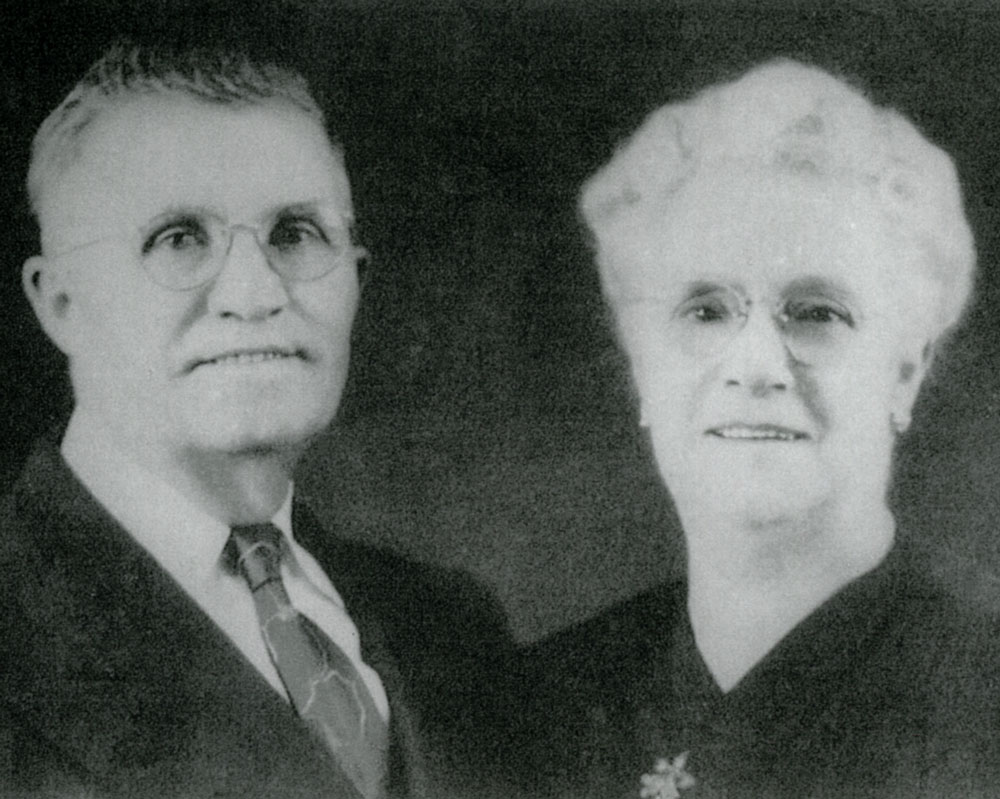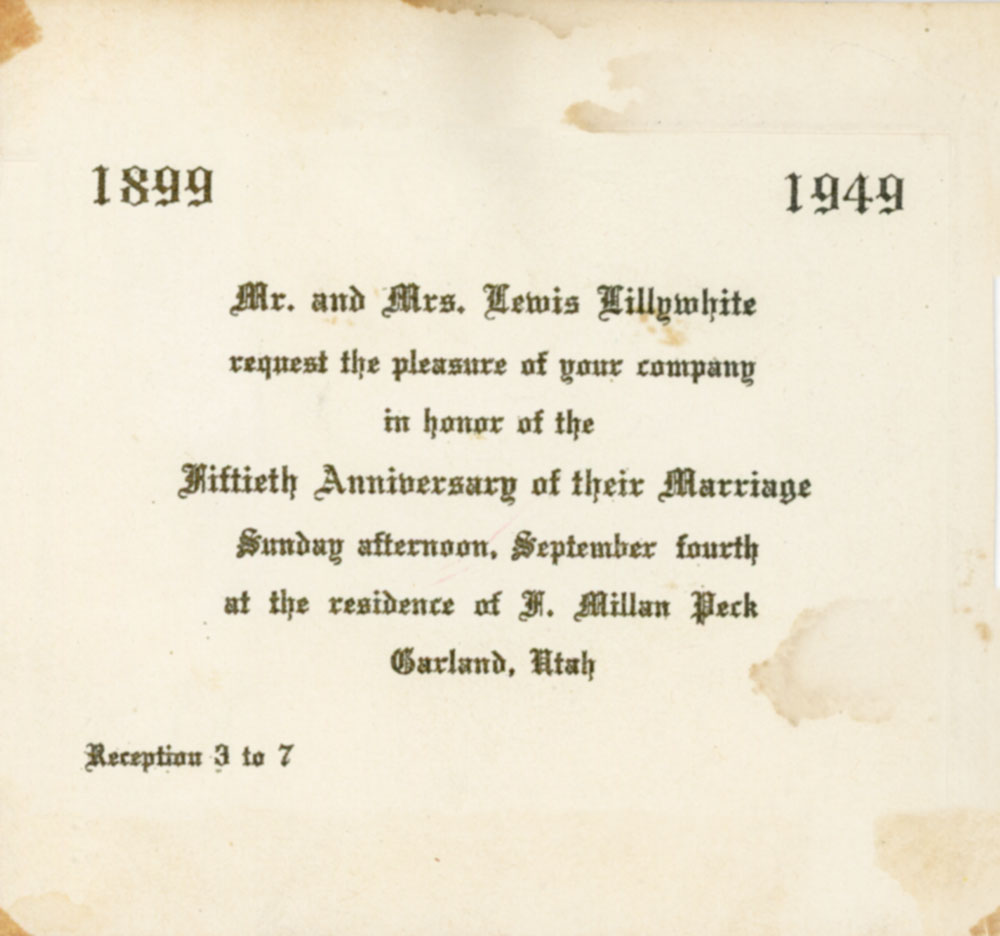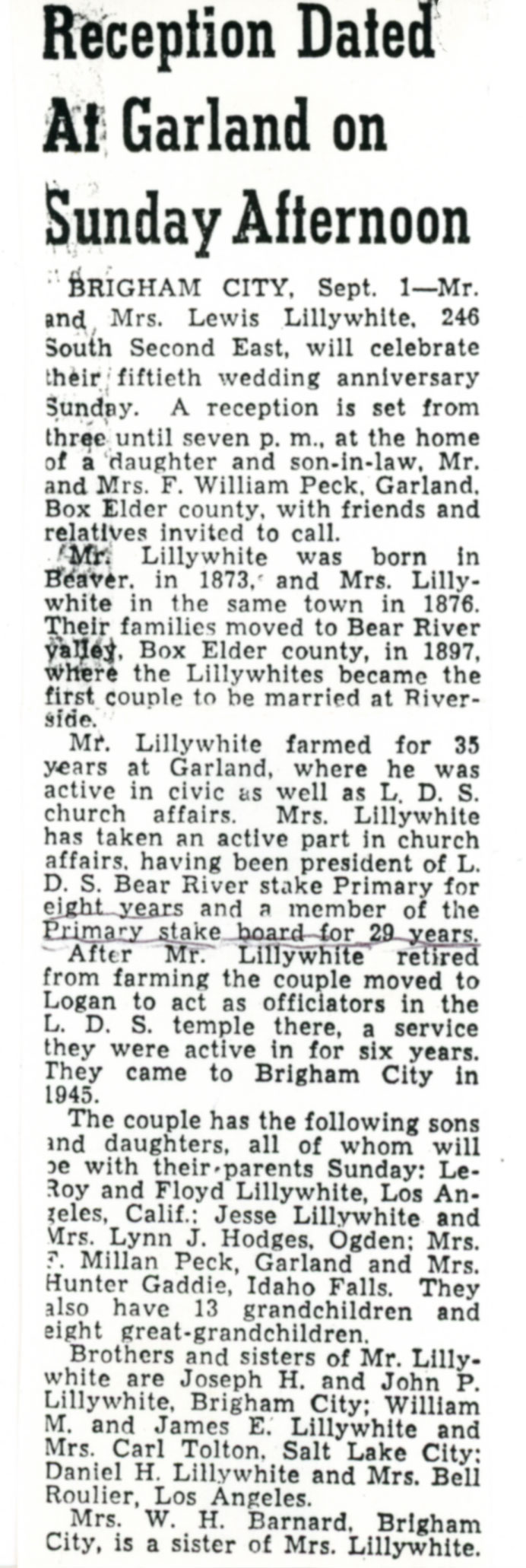Lewis Lillywhite
Dorothy’s Grandfather
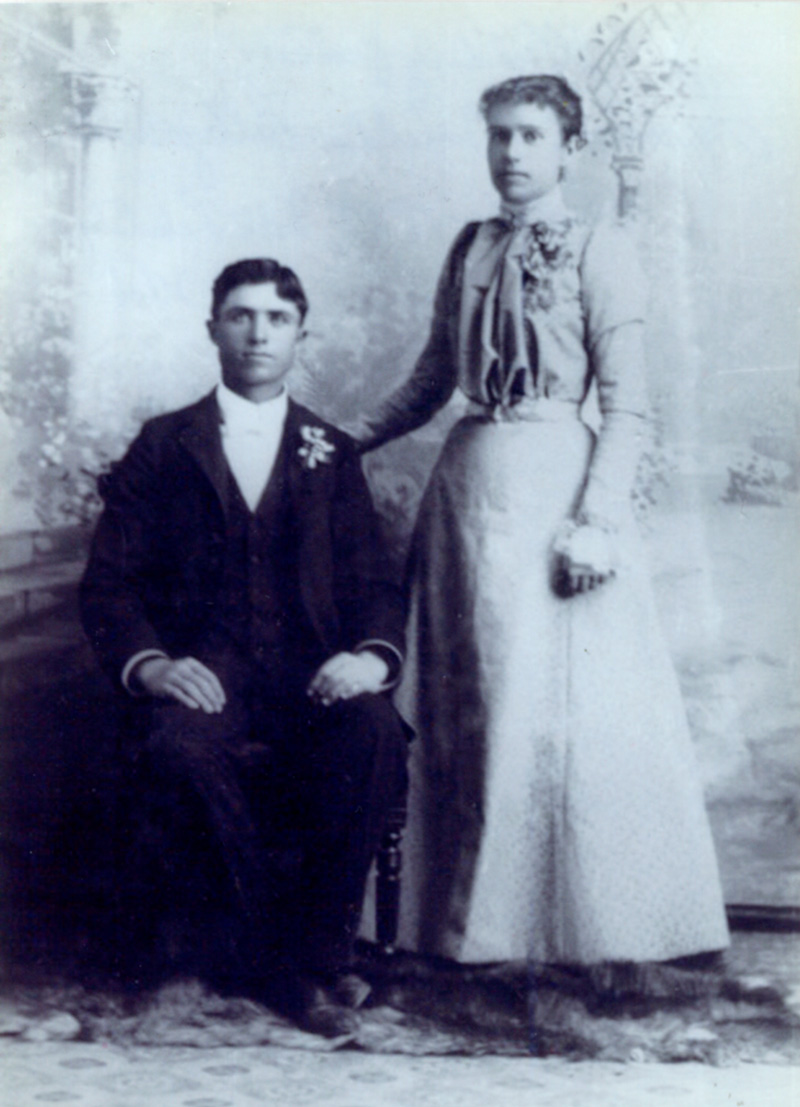
Lewis and Matilda Lillywhite’s wedding picture. Oct. 4, 1899. Salt Lake City, Utah.
Lewis and Matilda Lillywhite on their 25th wedding anniversary.
Lewis and Matilda Lillywhite on their 50th wedding anniversary.
Lillywhite 50th wedding anniversary invitation.
Lillywhite 50th wedding anniversary newspaper notice.
History of Lewis Lillywhite
Husband of Matilda Orwin Lillywhite, son of Mary Lewis and Benjamin Lillywhite Jr.
Benjamin Lillywhite Jr. followed his mother, Margaret, and his brother, Joseph, to Beaver, Beaver County, UT in 1860. They had been told that there was work for Joseph working on a dairy farm. Benjamin reached Beaver late in 1860, traded his horse for forty acres of land and squatter’s rights at North Creek, and set to work once more to build a log cabin. In 1863 an immigrant family by the name of Lewis came to Beaver from South Wales. With the Lewises was a dark-eyed, plump, pretty, and exceedingly pleasant daughter named Mary. Benjamin met and fell in love with Mary Lewis. They were married on Christmas Day of 1865 in the church endowment house.
Life in Beaver
Lewis Lillywhite was born on May 4, 1873, in Beaver City, Beaver County, Utah. He was the fifth child and the second son of Mary Lewis and Benjamin Lillywhite Jr. He spent his childhood growing up in Beaver with four sisters and five brothers—one brother, Benjamin (a twin to Joseph), having died at birth. His father, Benjamin, had become the second Mormon bishop in Greenville and a civic leader, and continued to prosper moderately. But he had a problem getting his boys, including Lewis, to go to church. In fact, they would ride their horses around the meetinghouse and up and down main street to torment him while he was trying to conduct meetings.
Benjamin had heard talk of the wonderful farming opportunities in the Snake River Country of Idaho. In the early spring of 1897, with his family, he headed north in search of a more favorable farming climate instead of working his land for planting in Beaver. But Benjamin never reached the Snake River Country. Instead, he decided to settle near the northern border of Utah, where gentle hills sweep down into a long valley along the banks of the Bear River. There, in the small town of Riverside, he settled with the unmarried members of his family.
Moving to Riverside
Matilda Orwin and her family lived in Beaver until 1896. The seasons were short in Beaver and there was always a scarcity of water. When her father, Jesse Orwin, got literature of the Bear River Canal being built and the abundance of water they had, he left Beaver with his family and came north settling in Riverside. They built a house and pioneered that country. At that time there were no electric lights or trains, and roads were dusty in the summer and muddy in the winter. There was no church building. They met in the school house for church and school as well as for social events. All the people were L.D.S. and everyone went to Sunday School meetings and dances and socials. They had very good times together.
Lewis and Matilda
Lewis fell in love with Matilda and they were married in the Salt Lake Temple in Salt Lake City, Utah, on Oct. 4, 1899. It took them three days to go by buggy to Salt Lake to be married. They were the first couple to be married in Riverside. Lewis built a house before they were married, as there were no houses to rent. He became president of the Young Men’s Association and Matilda was President of the Young Ladies’ Association. At about that time, the ward bought an organ and for a number of years, Matilda was the organist for everything and also became a counselor in the Primary. Their three oldest children, LeRoi, Pearl, and Jesse were born in Riverside.
Matilda’s parents rented their farm and moved to Provo to put her sisters and brother in school. Lewis also sold out in the fall of 1904 and moved to Provo. There they were blessed with their fourth child, Alta. They lived in Provo for four years and then went back to Garland, UT, where they bought a house and a farm.
By that time there was electricity, a train and a sugar factory in the valley. Lewis spent eighteen years working in the Ward Superintendency and as Superintendent of the Sunday School. Matilda was chosen to work on the Primary Stake Board. She filled that calling for 29 years, 8 of those years as president. In Garland they were blessed with their two youngest children, Floyd and Erma.
Farming in Garland
Farming was hard work and Lewis worked hard. However, he never allowed his daughters to do the hard work on the farm. They helped their mother and the boys did the farm work. At harvest time, they would hire a large crew to help with the work. Matilda and her daughters would work in the kitchen preparing a large meal for the hungry men. Money was often times scarce, but the family had plenty of good food to eat, even during the depression. While Lewis was working on the farm, Matilda was busy caring for the home and the children. She made all of their clothes and canned the food that was grown in their garden. Her children remember the delicious bottled pork, the wonderful cakes and bread and other food that was prepared. An icebox was kept on the porch. Lewis built an ice house and each winter he and the boys would cut enough ice from the canal and store it in the ice house with sawdust around it to keep it from melting so that there would always be enough for the icebox and homemade ice cream on Sundays and special occasions. When it was stormy outside, Lewis loved to sit by the warm stove in the kitchen and parch corn and eat it. Occasionally, Matilda would make divinity or taffy to pull. One evening, the family was enjoying her wonderful taffy. Lewis felt a lump in his and he retrieved a tooth that was stuck in the candy. ‘Erma,” he said to his youngest daughter. “You should put away your tooth when you lose it!” Imagine how they laughed when he found out that it was his tooth and the taffy had pulled it out.
Mining in Nevada
The family had some hard times as well as good times. Without modem medicines, illnesses and injuries could be very serious and they relied on the Lord for help through priesthood blessings. Matilda’s father, Jesse Orwin, owned three gold mines near Battle Mountain, Nevada, and while living in Provo, Lewis worked in those mines. The summer Pearl was four years old, Matilda took her two children, Roi and Pearl, and traveled by train to Nevada to visit Lewis.
Tragedy with Fire
What fun they had with the miners! Every night they would build a big bonfire near the bunkhouse and all would sit around it and sing. One morning. Pearl and Roi found some matches and tried to build a bonfire. She had seen the miners hold the lighted match close to them and shield it with their hands so it would not go out. As she tried to mimic them, the match caught her bonnet string on fire. She began to run, which caused the flames to increase and she was probably saved from death because she fell down. Roi ran to get their mother, and she rang a large bell which brought all the miners pouring from the mines. Pearl remembers the miners standing around her with tears rolling down their cheeks. They did the worst possible thing— poured oil over her burns and covered them with cotton. It stuck to her skin and was not able to be removed until the burned skin came off. When they returned to Provo by train, the train was full of injured victims of the San Francisco earthquake, which had happened just days before (1906). She remembers the crying and moaning, and in her child’s mind, she thought everyone had been burned. She was in the Provo hospital a long time and missed her first year of school. She was administered to many times and given many blessings, and she knew that was why she recovered without terrible scars.
Priesthood Blessings
The children loved to go swimming in the canal in Garland that ran close to their farm. Pearl caught typhoid fever from the canal water, and again came very close to dying. She said it was the Priesthood blessings that made her well. Erma became very ill and the doctors thought she had appendicitis. They wanted to operate but her father, Lewis, would not let them. He gave her a Priesthood blessing. The next day her skin turned a yellow color and they determined that she had yellow jaundice due to her kidneys instead of appendicitis. If they had operated, Erma would have died. Lewis and Matilda loved the Lord and had great faith in His ability to help them during these times.
Missionary Service
The children began to grow up and all of them but Roi and Pearl graduated from Bear River High School. Roi and Pearl graduated from Box Elder High because Bear River High wasn’t built then. The boys were all called on missions. Their oldest son, Roi, was called to England. World War I had started and they told him to wait. Eventually all the missionaries were called out of Europe. Their second boy, Jesse, spent 30 months in Australia, and their youngest son, Floyd, spent 30 months in the German Austrian Mission.
California, Logan, Brigham City
In the fall of 1938, Lewis’s health was failing and the boys didn’t want to farm, so they sold the farm and traveled to California for a year to live with Lewis’s sister, Jane and her husband, Martin Anderson, who were having hard financial times. Jane and her husband had used all of their money to buy an apartment building of renters, thinking that this would keep them for the rest of their lives. However, just as soon as they bought it, the renters all moved out and they knew that they had been fooled into buying the building.
Lewis was sure that he couldn’t sleep without his feather mattress, so they tied it to the top of their car and away they went. They bought all the food and helped them until they could get on their feet. Then, knowing that California was not for them, they moved to Logan where they could work in the temple. It wasn’t long until they were called to officiate, making these some of the happiest years of their lives. They made many friends and all loved to get together to socialize. Matilda got arthritis and it soon became impossible for her to climb the stairs in the temple. They sold their home in Logan and tried to buy a small one or build. When they saw that this would not work out, they resigned their temple work, which made them very sad (especially Lewis), said farewell to their many friends, and moved to Brigham City where they purchased a small house.
Their ward house in Brigham City was about a block from their house. Lewis would faithfully walk to church each Sunday. However, by that time he was wearing hearing aids and he would come home resolving never to go back because the babies would cry and cause his hearing aids to make such a noise that it would about take his head off. The next week he would be in church again. The many dogs in the neighborhood soon learned to avoid their lawn. Not wanting to injure the dogs, Lewis became very adept at using a sling shot to let the dogs know that they weren’t welcome. They soon got the point! They would go clear across the street to avoid the Lillywhite lawn.
His daughter Erma told about a fun trip that her Dad and Mother were able to take: “Thinking of my Dad, I’ll never forget the time that we went to Seattle to visit Pearl and Millan. We got up to the top of this mountain about half way on the way and you overlooked the whole valley and it looked just like a big patchwork quilt. It was just beautiful that time of the year.
Failing Health
And I remember my Dad saying, “How come I ever settled in Garland when there was a place as beautiful as this.” And I remember on that trip we took a ferry ride somewhere and I remember Dad getting quite sick. And I think that was the beginning of his health going down hill. I think he had cancer at that time and it just began to get worse. And I remember how sick he looked on the ferry but how much he enjoyed it. He stood by the railing all the time watching the water. He just couldn’t imagine anything so big and beautiful. We had a good time on that trip and I was always glad that Dad got to go.”
Memories of Lewis and Matilda
Their children and grandchildren all remember the wonderful welcome Lewis and Matilda would give them as they came to visit. Matilda would bake delicious sugar cookies and bread and many of her family still have the very special doll bonnets and bootees as well as hot pads and doilies that she crocheted.
They lived to celebrate their 50th wedding anniversary. At that time their family presented them with a book of letters, one from each family member. The preface to the book read: “We, the family of Lewis and Matilda Lillywhite, dedicate these letters to their memory, and to show our appreciation for their love, guidance and sacrifices which they made for us throughout their life.” Lewis passed away, after suffering with cancer, on Dec. 30, 1954, in the Brigham City Hospital, and was buried on Jan. 3, 1955, in the Brigham City Cemetery. Matilda and Lewis had been married for 55 years. Matilda passed away in the Brigham City Hospital on March 30, 1959, in Brigham City, and was buried on April 3, 1959, in the Brigham City Cemetery. Their love for each other and for their family was the most important thing in their fives. Erma was with her mother when she died and heard her say these last words, “Lew, Lew.” Her family knew that Lewis had come to take her home.
